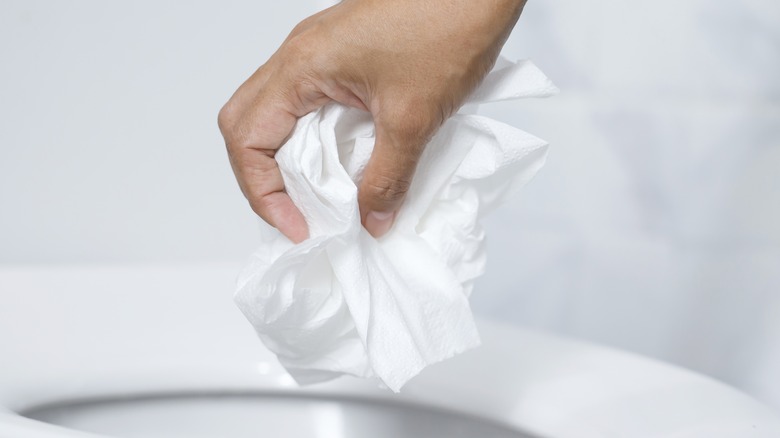Cutting Carbs Has An Unexpected Effect On Your Poop
"Cutting carbs" is a generalized term to describe different eating plans. People could be tweaking their existing diet to include less carbohydrate or they might follow specific low-carb diets — like keto, Atkins, low-carb high-fat diet (LCHF), low-carb paleo diet, or the carnivore diet. Each of these diets has different limitations on just how much carbohydrates one can consume but the general idea is to go low on this macronutrient and higher on the other two — protein and fat.
Whether you experience changes in your bowel movements might be unique to you; but for most people, a low-carb diet is a trigger that can change their poop habits, especially at first when your digestive system is still getting used to it all.
For example, on a keto diet, you may have diarrhea, although this is not common. Keto diets are typically high-fat and low-carb. "There may be a delay in enzymes that digest fat to respond to the increasing amount of fat in your diet. If fat doesn't get broken down in your small intestine the way it's meant to, it travels into your colon and gets digested by bacteria that can lead to gas, bloating, and fat in the stool," explained Colorado's Kaiser Permanente gastroenterologist Dr. John Riopelle (via Everyday Health). Diarrhea could happen with an LCHF and paleo diet too. In the case of paleo (a high-fiber diet), however, it is because the average adult doesn't get sufficient fiber in their diet to begin with. Suddenly upping your fiber through fruits and vegetables may cause diarrhea because insoluble fiber has a laxative effect.
Constipation is more common on a low-carb diet
The keto, carnivore, and low-carb paleo diets are known to cause constipation. Carbs are one of the primary sources of dietary fiber — both soluble and insoluble. In a typical diet — for instance, a Mediterranean diet — there is a focus on getting plenty of fiber via whole grains, fruits and vegetables, lentils, etc. While there's nothing to say that you can't have these foods in your quota of "net carbs" (as is often calculated in a keto diet), sometimes, you might not be eating the right type of carbs for the job (poop).
If you're having constipation on a low-carb diet, a lack of fiber can be the main culprit. Fiber makes you poop, in that it draws water to your stools, gives it bulk and softness, and also helps your "colon work like a muscle to move things through more easily," per Dr. John Riopelle (via Everyday Health). Without fiber, your bowel movements will be, well, "backed up". Simply adjusting to a low-carb diet can also throw your poop habits into chaos and cause constipation.
In the case of paleo, constipation could occur if the person isn't doing the high-fiber eating plan right. Going low-carb doesn't mean being low-fiber, especially on a paleo diet which typically prioritizes the consumption of fruits, vegetables, nuts, and seeds (fiber-rich foods).
In a carnivore diet, constipation happens because of low fiber and dehydration. When your body isn't getting carbs, it breaks down glycogen stored in the muscles and liver. Dehydration is a side effect of excessive glycogen breakdown and it can also lead to constipation.
How to handle poop changes when on a low-carb diet
Understanding the essentials for healthy bowel movement — like adequate fiber intake, exercise, hydration, probiotics, etc. — can go a long way no matter what diet you choose to try. As we've observed already, going low-carb doesn't have to necessarily mean eliminating high-fiber options. The key is to consume non-starchy, high-fiber carbohydrates (in your allowed quota) to keep your digestive tract healthy and happy. This can come via fruits, vegetables, nuts, seeds, lentils, and whole grains.
Keeping an eye on your sodium levels could also help, especially with constipation. While one of the health benefits of low-carb diets could be that you cut out ultra-processed (salty) foods and simple carbohydrates, this might also result in a sodium imbalance. Making sure you're getting sufficient sodium by flavoring your proteins and vegetables can help with this problem.
Also, go easy on the dairy. When you're cutting carbs, you might up your dairy intake, and this can cause constipation in some.
Furthermore, some experts recommend the use of laxatives for constipation, but this should only come as a doctor's recommendation. The same can be said about taking fiber supplements. Although the preferred source of fiber is whole foods, you could discuss this option with your doctor. If any of your poop-related changes persist despite the modifications, you may want to see your doctor about this too. Constipation and diarrhea can both be side effects of a lot of underlying health conditions. Your diet might not be the only reason.



